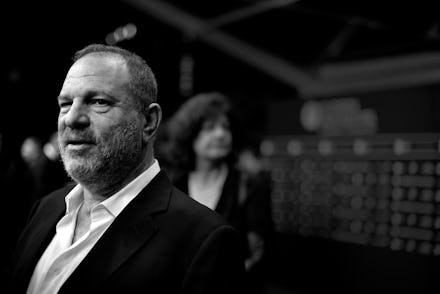The Harvey Weinstein allegations remind us that women are trained to feel guilty over sexual assault

There’s a commercial that debuted in the early ’90s, about a year or two after Anita Hill came to prominence for accusing Clarence Thomas, then a Supreme Court nominee, of sexual harassment. A woman, sorting through papers in an office, is approached by an older man, presumably her superior. He begins by complimenting her on her work, but then swiftly switches to making inappropriate comments — talking about her body, calling her sexy, insinuating that she could really go places if she gave into his advances. With every degrading comment, the woman shrinks (literally, thanks to some shoddy special effects) until the end of the commercial, when she finally responds to her harasser with a quip that’s stuck with me for decades: “We’re talking about sexual harassment here. And I don’t have to take it.”
A few years after that commercial aired, then-21-year-old actress Asia Argento was at the Hôtel du Cap-Eden-Roc, alone in a room with Hollywood producer Harvey Weinstein. According to the New Yorker, Weinstein requested a massage from Argento; though she rebuffed him at first, she reluctantly agreed. Allegedly, Weinstein then lifted her skirt up, forced her legs apart and proceeded to perform oral sex on her, ignoring her as she repeatedly cried no. Decades later, Argento says she still feels responsible for her own assault: “If I were a strong woman,” she said to the New Yorker, “I would have kicked him in the balls and run away. But I didn’t.”
As a result of that education, of a culture of “no means no,” I learned to blame myself for every assault, every bit of harassment, that I experienced.
The feeling that Argento describes is a familiar one for me. I grew up in the ’90s — my childhood was punctuated with stories of strong women who were willing to fight back, with lessons of how it was every woman’s duty to speak out against injustice, to loudly say no to unwanted sex, to learn how to physically fight back against would-be assaulters. At my first post-college job as a sex educator at a college in the Bronx, the administration distributed a list of sexual assault prevention tips. Every single one focused on how women could curb their behavior to stay safe: by avoiding dark, abandoned streets; by carrying mace; by learning self-defense strategies that would allow us to attack our attackers and run away to safety.
As a result of that education, of a culture of “no means no,” I learned to blame myself for every assault, every bit of harassment, that I experienced. Like Argento, I assumed that if I had somehow been more forceful, if I’d been willing to resort to violence, if I’d just taken that stupid self-defense class, I could have spared myself years of trauma.
But the problem with our insistence that women — or, really, sexual assault victims of any gender — can prevent an assault with the right set of steps is that it ignores the reality of what it’s like to experience assault. Many of us talk of the “fight or flight” response; less discussed is fight, flight or freeze. If your brain’s assessment of a threat is that it’s too powerful to fight off and impossible to outrun, the body often responds with a kind of paralysis. Sexual assault victims who find themselves shutting down and enduring aren’t weak; they’re employing a survival strategy of appeasement. Argento noted to the New Yorker that she eventually stopped resisting and started feigning enjoyment: If she started to act like she liked it, her suffering would end more quickly.
Men are never expected to be anything other than unbridled id: If they take everything they can get from their victims, they’re just doing what men do.
It also ignores the broader social landscape that abuses and assaults occur within. It’s one thing to kick a stranger in a dark alley in the groin; it’s a wholly different scenario when the person violating your body is your boss, your partner or your friend. Weinstein’s alleged victims have all noted that they endured his abuses, or stayed silent, because they were afraid of retaliation, because they feared for their careers.
And they weren’t wrong to think that. The cost of damaging a relationship with an abuser by refusing their advances or ruining their reputation by publicly acknowledging an assault could potentially be more traumatic than quietly suffering through an assault. The fact that Weinstein was allowed to allegedly terrorize women for decades — despite his actions being an “open secret” in Hollywood — seems to prove that victims coming forward would do nothing save for destroy their own careers.
Most troublingly of all, when we rely too heavily on this notion that strong women fight back and speak up and prevent assaults through sheer force of will, we let abusers off the hook for their abhorrent actions. Time and again, we’ve seen the actions of men like Weinstein excused with phrases like “locker-room talk” or “she was asking for it” or intimations that women consent to unwanted sex by being promiscuous or drinking alcohol or dressing in a way that supposedly wasn’t sufficiently modest. Men are never expected to be anything other than unbridled id: If they take everything they can get from their victims, they’re just doing what men do.
And the fact that we allow men to do that, while we continue to teach women that whether or not we’re assaulted is entirely within our control, is the biggest crime of all. Men are allowed to give into their most horrific impulses, while women are held accountable for the damage that results. As Argento has recounted, the trauma of being assaulted gets compounded by the trauma of — wrongly — being made to feel that the whole thing was your fault.